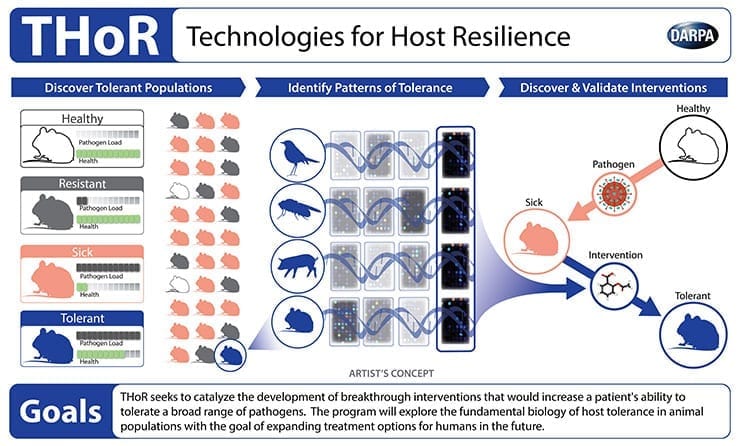The Defense Advanced Research Projects Agency (DARPA) has announced a new Technologies for Host Resilience (THoR) Broad Agency Announcement (BAA) to catalyze the development of breakthrough interventions that would increase the ability of patients’ own bodies to tolerate a broad range of pathogens.
Conventional disease treatments such as antibiotics have almost exclusively sought to emulate natural resistance by keeping patients’ pathogen levels as low as possible. This approach has been incredibly successful but has an increasingly serious downside: Any pathogens that survive a particular treatment can defy it from then on, giving rise to new antibiotic-resistant strains.
The rising prevalence of multi-drug-resistant pathogens, as well as emerging biological threats, makes developing new medical countermeasures a national security priority. The THoR program will explore the fundamental biology of host tolerance in animal populations with the goal of expanding treatment options for humans in the future.
“Our aim with THoR is to lay the foundation for new treatments that would enable the body to more easily and safely cope with infection,” said Col. Matt Hepburn, DARPA program manager. “Among other potential advantages, these new treatments would prevent the body’s overreaction to infection and buy time for the individual’s natural recovery mechanisms to kick in. We want to help patients ‘weather the storm’ during the critical phases of acute illness.”
If THoR is successful, it could provide substantial benefits to warfighter health and military readiness. New treatments would help reduce reliance on antibiotics and complement ongoing efforts both to fight microbes themselves and slow the emergence of antibiotic resistance—problems the White House aims to address in a new initiative announced last week.
THoR could also help treat life-threatening infections and related illnesses, such as sepsis. A catastrophic overreaction by the immune system to large-scale infection, sepsis afflicts 18 million people a year worldwide and kills between 30 and 50 percent of them. Sepsis poses a significant threat to warfighters who suffer combat injuries that predispose them to infection.
THoR plans to explore three key technical areas:
- Discover Tolerant Populations: Perform animal studies to examine intra- and inter-species differences in host fitness; identify sub-populations and species that are tolerant to infection.
- Identify Biological Mechanisms of Tolerance: Define and characterize the basis for tolerance across multiple biological scales, e.g., species, tissues and cells.
- Identify and Validate Pro-Tolerance Interventions: Recreate tolerance mechanisms in susceptible animal populations.
Potential participants are encouraged to examine novel mechanisms of tolerance, which may extend beyond individuals’ immune systems.
DARPA has scheduled a Proposers Day on Monday, April 27, 2015 in Denver, Colo. Advance registration is required. Further details on the program are available via Solicitation Number: DARPA-BAA-15-21.



